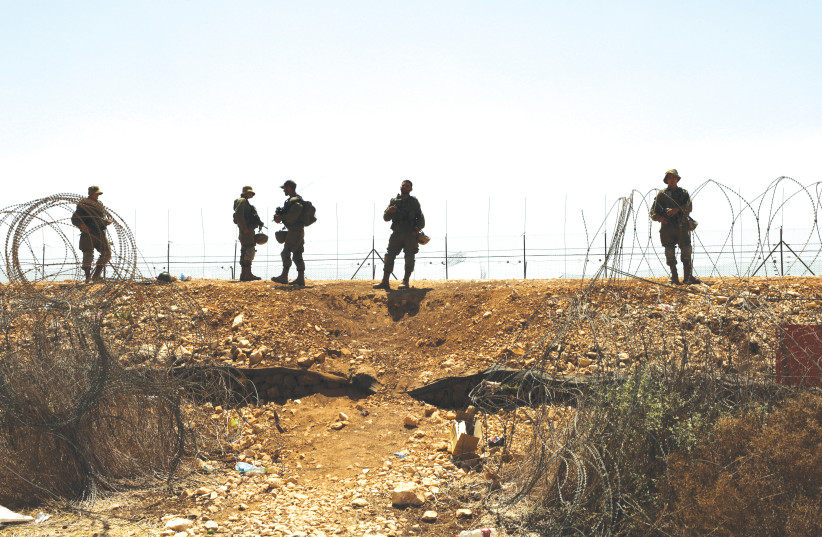This newspaper recently opined in an editorial that we needed to do more to support our soldiers. The thrust of this call was for practical, yet important, considerations, including their living conditions such as housing, food, transportation and salaries.
There is a dual sense in this country of the Army being a rite of passage and also the attitude of “I had to deal with it, and so will you.” This likely accounts for some of the inattention to the conditions many soldiers face.
The Post’s recommendations are unassailable. Sadly, however, they do not go far enough. The concern for the welfare of our soldiers must include a focus on the protocols under which they are required to operate in times of stress and confrontation.
These conditions range from the utter humiliation endured by soldiers at checkpoints and sensitive guard positions as anti-Israel demonstrators are allowed to scream into their faces with no distancing whatsoever, to the excruciating steps that a soldier must undergo before defending himself against a potential attacker.
Some of these are judgment calls where reasonable people might differ. The concern, for example, about not having a soldier act rashly, is a viable and defensible one.
Some, however, such as the requirement of having soldiers harassed by demonstrators with no recourse, must be seen as conceits by top brass eager to burnish the moral bona fides of the army.
I have never seen a convincing, let alone compelling explanation for why soldiers need to be treated as virtual punching bags. Concerns about soldiers reacting aggressively can be addressed by requiring that any demonstrator maintain a critical distance from a soldier.
The crude analogy is that soldiers are “state property,” and the state will not countenance vandalism of its property. Setting distances and creating parameters for demonstrations has nothing to do with free speech, but rather human dignity and a desire to prevent physical confrontation.

Ironically, the Army’s protocols have created a vacuum that pro-Israel civilians have filled. My organization, Im Tirtzu, initiated a program called “Filming the Filmers,” in which our activists confront anti-Israel demonstrators in much the same fashion that the demonstrators confront our soldiers. So, while demonstrators are filming at close, dare I say, intimate distance from soldiers, our activists return the favor to the demonstrators.
This “sauce for the goose, for the gander” attitude might also be seen as two wrongs that don’t make a right. However, if that is true, it means the underlying protocol is wrong, which it clearly is.
The treatment of our soldiers at checkpoints is the small issue that speaks volumes. Our soldiers are our greatest resource, our future and the best of what we are about. There is little doubt that they are being immersed in a culture of forbearance, of maintaining their cool and their judgment under pressure.
But when that concern dictates conduct that actually endangers soldiers in the name of “looking good,” we have a major problem.
We point with pride to the fact that ours is a citizens’ army. But this is really only true about the soldiers who serve their time and then go on about the rest of their lives. For many higher-ups, Israel’s is a professional army, composed of career officers.
We should be very grateful for that dedication and continuity, but we should also recognize the risks of disassociation with the little guy or gal as one moves up the ladder of rank and responsibility.
At the highest ranks, I have always feared that their priorities took on a peer relationship model with other leaders of other armies. In other words, what would the Joint Chiefs think? Will I continue to get invited to prestigious conferences, and do I have to worry about getting an arrest warrant from the ICC if I step off a plane in Europe?
To the extent that these factors are impacting those at the top, the soldier on the front line might end up paying the price for an attempt to find a solution. The recent tragedy of Barel Shmueli on the Gaza border hit such a nerve, unleashing the simmering concerns of many parents that their children’s safety was not the paramount concern of army higher-ups.
I believe that the army should show the same courage in facing these concerns as it has shown on countless occasions in the past. The army is our most trusted and relied-upon institution. We are all invested in, through our own participation and that of our children.
We are looking for a reciprocal degree of concern, for a prioritizing of the sensibilities of the army that puts the welfare of our soldiers and our citizens at the top level of concern, not somewhere below demonstrations of morality that no other army would even contemplate.
The author is the chairman of the board of Im Tirtzu, Israel’s largest grassroots Zionist organization, and a director of the Israel Independence Fund. He can be reached at dougaltabef@gmail.com
